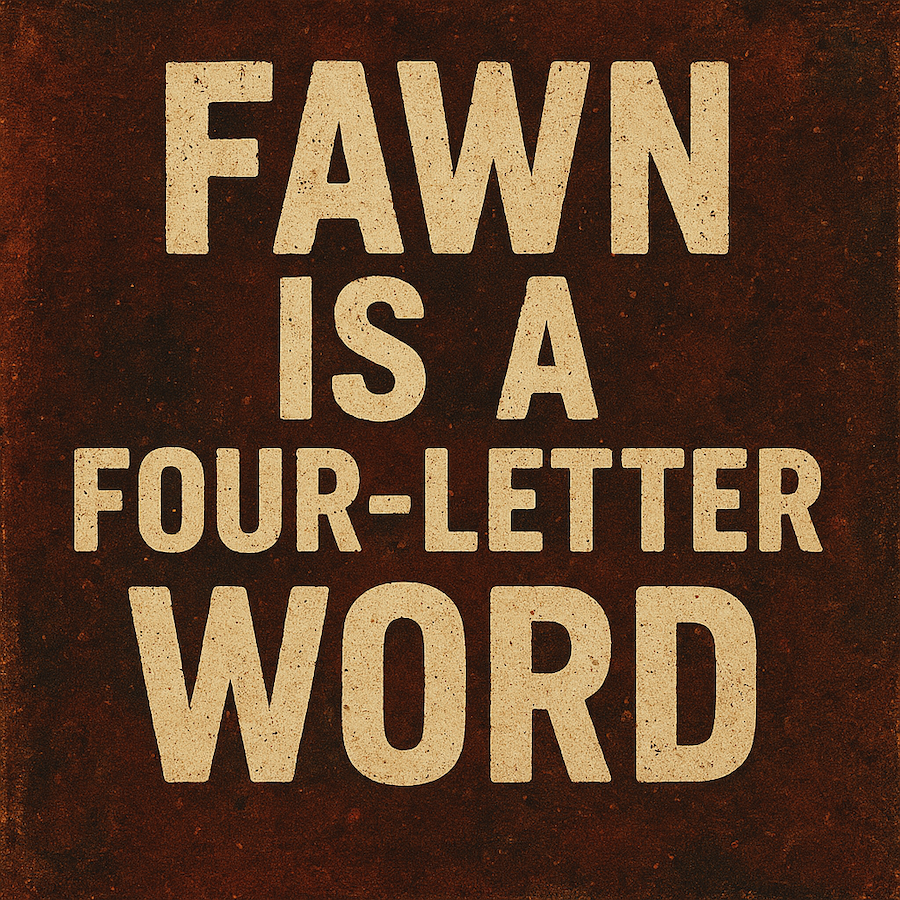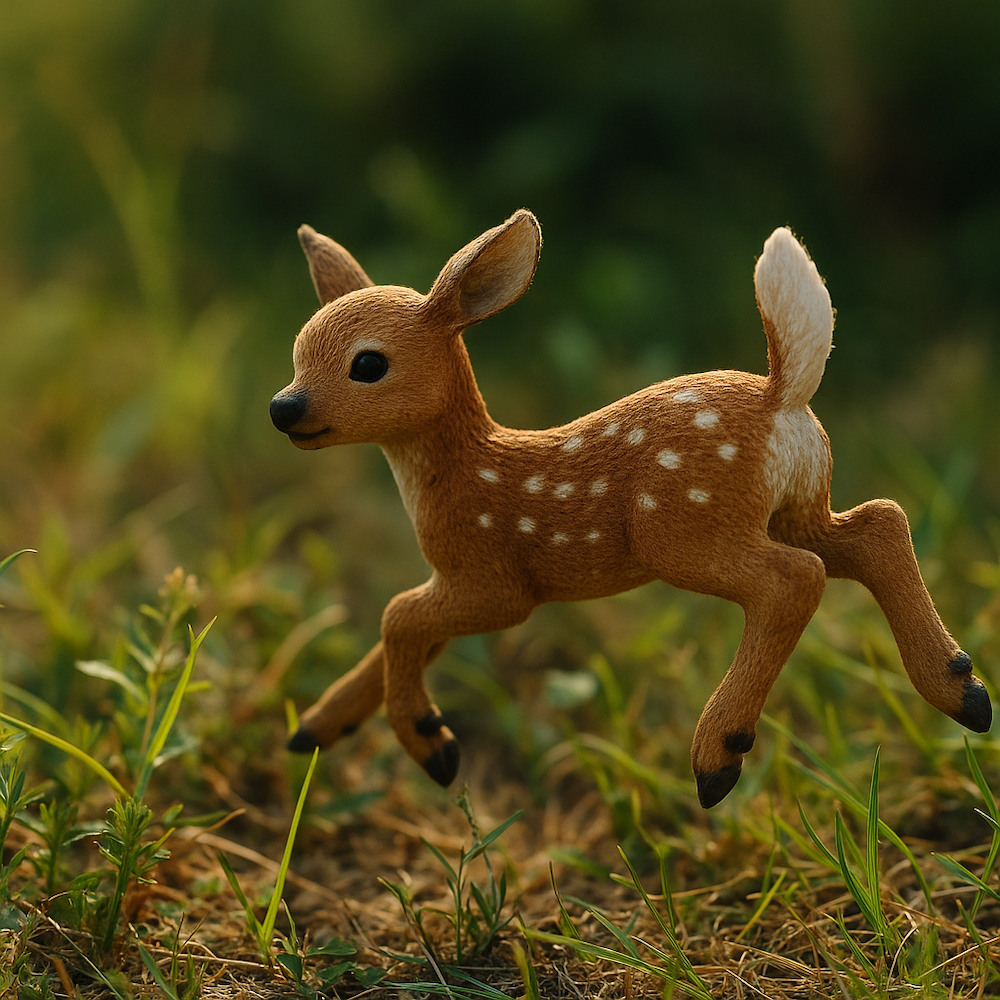
Or how many times can I use the word “fuck” in a single of writing?
I tend to think about my nervous system only when I am feeling fucking nuts: the escalation of flight, the shutdown of freeze. I know this kind of dysregulation all too well. These are my steadfast, vigilant companions, and the challenging nervous system states that I know most intimately. Furthermore, recognizing, understanding, and accepting freeze has been the most fundamental shift in my therapeutic life. Big stuff.
Wait. I shouldn’t assume you know where I am starting, so let me take a step back… We all know the classic “Dynamic Duo” of survival strategies: fight and flight. You may also be aware of the more recent addition to the nervous system’s “Legion of Doom”: freeze. But you may not know about the fourth character I’m dedicating these words to. If you don’t, allow me to introduce the obsequious henchman of this trio. Gentlepeople, please meet Fawn. Okay, I’ll stop it with the superhero/villain shit now.
Instead, I’ll take a more serious/practical moment to acknowledge that we are always in some nervous system “state” or another. Even experiences we find demonstrably good and pleasant are the result of our nervous system shifting in and out of various single and mixed states of being. The simple parasympathetic state—where we mammals can “rest and digest”—is perhaps the most familiar. Likewise, we ideally enjoy the more nuanced ventral-vagal state of social engagement and co-regulation. The good stuff!
At the risk of alienating those not familiar with all this jargon, I’ll continue cause, well, I think it’s cool. Safely inhabiting a place of physical intimacy is now viewed as a mixed dorsal–ventral state: it requires the stillness and deep calm of the dorsal, combined with the connection and co-regulation of the ventral. Even play is now recognized as a complex, functional state, combining the mobilization of the sympathetic nervous system (fight or flight) with the safety-seeking, social-cue-reading ventral-vagal system. Crazy stuff!
Apologies if this is getting too bogged down in terminology. This is not meant to be a primer on Polyvagal theory. For that, consider Our Polyvagal World by Stephen and Seth Porges. I’m only aiming to illustrate the complexity and flexibility of our nervous system.
That said, I’m not writing this to explore the happy and healthy ways our nervous system guides us through life; I just want to name a few and acknowledge that even feeling excellent is the result of our evolution and physical biology. It’s not only when we feel panicked, furious, or petrified that our nervous system is steering the ship. And let me remind myself, as much as anyone else, that even the most challenging “negative” states evolved to keep us safe, intact, uneviscerated, fucking, raising our babies, and reinforcing social bonds. As social mammals, there’s no escaping our central nervous system, the vagus nerve, and its many mercurial states. But as the title of this piece reveals, I’m writing about my least favorite of all these states: fucking fawn. Ugh. Just ugh.
Wait. Again. I might actually take another step back to share more personal context and say that freeze is the state I fear most because it can have the deepest, most intense, and most prolonged impact on me. Freeze is the stuff my worst dreams are made of—literally. I’ve had recurring nightmares since my young adulthood, where some invisible, malevolent entity takes hold of me. It paralyzes me. It steals my voice and my breath, and then… I’m not sure what would come next because I always wake at that moment, gasping for air and filled with panic.
Awake and in the real world, freeze can feel just like that—like there’s no escape from the bound and seized up hell that is your mind, body, and whatever terrible circumstance you’re in. It can feel world-rocking and shattering. If freeze is a natural disaster that leaves you reeling and bleeding out, then fawn is all the shit-planning that left you unprepared, resourceless, and unevacuated when the flood/earthquake/meteor hits your small town.
Fawn is just a new name for a very old behavior. It’s the impulse that turns a wolf belly-up—or, if not that, then the uber-friendly, trembling, tail-between-the-legs behavior of a rescue dog. In humans, it’s the trauma response doing a lot of the heavy lifting behind our people-pleasing and porous boundaries. In its most extreme and dysfunctional expression, it accounts for how so many of us endure toxic and abusive relationships. Fawn may even help explain Stockholm syndrome.
And what a funny term: fawn. Fawning.
I’ve been journaling recently about fawn and how pervasive it has been in my life up until now, and I kept feeling frustrated and annoyed by Grammarly and its repeated attempts to correct all my instances of “fawn with” to “fawn over.” And let me tell you, those are two very different fawns. This inability of Grammarly’s AI to pick up on the distinction—and arguably the newer usage—prompted me to dedicate serious time and energy to writing this. There’s so much more literature and thought on fight, flight, and freeze. Work on fawning just hasn’t caught up. And, of course, I am not a researcher in trauma studies (yet!) or, at this point, trying to contribute anything substantive to the literature. I am 1000% not qualified for that.
I can, however, report on my own experience and how it aligns with the little I’ve read about fawning. At the moment, the texts within arm’s reach are the aforementioned Our Polyvagal World and Pete Walker’s Complex PTSD: From Surviving to Thriving. I also feel I can make some reasonable assumptions about how fawn operates in many people with complex PTSD, since human nervous systems and brains all run on roughly the same OS.
If you have endured complex trauma, you have probably fawned. At its most functional, fawn almost presents as a prosocial impulse. It looks like a bid for connection. It seems to promote harmony. It keeps us safe. But in that sought-after safety, things go south. It isn’t connection; it’s appeasement. It’s designed to soothe and placate those we perceive as capable of harming us. And sure, it creates “harmony”—but a one-sided, discordant thing, purchased at the expense of your own agency.
And while it may look like connection, it doesn’t feel like it. It feels like self-betrayal. Here’s the tricky part: your ventral vagal social engagement system is fully engaged. You rely on it to keep a pleasing demeanor, speak in calm, agreeable tones, move toward and with, and ultimately acquiesce. You’re all agreeable words and sweet intent—yes, engagement—but none of it is truly yours. In that fawning moment, it can feel like you’re making a choice. You might even hoodwink yourself into believing you’re in control.
Here’s where the betrayal lands: looking back, fawn feels complicit. You remember speaking, moving, agreeing. You think you chose to turn belly up, right? But it wasn’t choice or genuine engagement. You were just a hair’s breadth from the immobilization of freeze. And if you were “lucky,” you were dissociating to the hilt—because who wants to remember pleasing and appeasing an asshole, abuser, or worse, an assailant? The emotional and somatic clusterfuck of your social engagement system being fully activated while you simultaneously shut down into a dissociative state of complete self-abandonment is like no other. And so, for me, fawn almost always breeds one thing: shame. Shame that I was the person who made these choices, or just, I was the person that allowed this to happen.
A side note: Fawning is also grist for the patriarchal mills. Let’s make no bones about it: patriarchy, misogyny, and even white supremacy feed off fawning. They gladly wield this trauma response like a weapon, one no one acknowledges, and that anyone in a position of power can benefit from. If I could growl believably, I would.
So how does this happen? Why are some people so prone to fawning? For folks with C-PTSD, it starts with a million small moments in childhood where your agency is stripped away. Put that on. What do you mean, the tags hurt? Don’t be ridiculous. Sit down and don’t move. You’re going whether you like it or not. You’re not getting up from this table until you clean your plate. Stop sucking your thumb, you’re not a baby. Come here, right this instant. Shhh, you’re making too much noise. Stop that, or I’ll give you something to cry about. Be careful; you’re going to hurt yourself. Say hello to Mrs. So-and-so. Say you’re sorry to your brother. Kiss your cigarette-smelling aunt. Stop making such a racket! Sit in the lap of the awful family friend. Don’t be rude. Who do you think you are? I am so disappointed in you. What were you thinking? What makes you think you can do that? Stuff it, shut it, and do as I say.
And on and on and on, in infinite ways, for years. Or so I’m told.
At some point, your young nervous system shifts into a place where resistance feels dangerous, and acquiescence feels like, oh, I don’t know, a safer bet. And it’s probably the only way to maintain the connection that you believe keeps you safe and alive. I suppose that if it happened only a handful of times, one might grow into adulthood with your sense of agency more or less intact. But complex trauma does not grant that privilege.
I did not grow into adolescence or adulthood with anything close to a sense of autonomy or self-possession. Sadly, I lacked almost every crucial skill. I had no idea how to set boundaries—and, worse, the very idea of setting them felt unsafe. ‘Cause guess who doesn’t like it when you set boundaries? Neglectful and abusive adults, that’s who. I was utterly unable to advocate for myself with anyone older than me or anyone I perceived as higher up in the hierarchy—my parents, relatives, teachers, you name it. Having no voice to ask for or insist on what you need sets you up for all sorts of heartache—and, you guessed it, more fawning.
That heartache is hard. It’s the sting of self-betrayal, which to me has a strange, sticky-sweet feel to it, like the smell and taste of fermented fruit in my mouth. Those parts of me that fawn feel as though they’ve let so much of me rot away at my own expense, ignoring my intuition, agency, and actual safety for fuck’s sake!
And while all this pleasing and appeasing is happening, a very nonplussed, desperate voice in my head is saying, “This is what’s best. They know what’s best. This is for your own good.” That voice reenacts the way I was treated in childhood—Mom and Dad know best, right? Their overarching message back then was, “You have no idea what’s good for you.” Someone has to keep up the hard work of never believing otherwise, because according to my younger self’s story, this strategy has kept me alive. But at what cost?
The truth is, fawning begins as a wildly adaptive survival strategy in childhood. But carried into adolescence and adulthood, all that appeasement becomes maladaptive—and can push you into one risky, even dangerous, situation after another.

Tiny Sleeper
.
.
.
.
.
.
This is the point where I need to offer a **trigger warning**. If you don’t want to read about fawning in the context of sexual encounters—or about my lamentable sex life—stop here. You can skip ahead, past the next section and the bananas graphic of the birds and the fawn, and begin again with the paragraph that begins, “—>My poor mom….”
.
.
.
.
.
All the triggers here:
By the time I hit puberty, boys had shifted into the category of “above me in the hierarchy.”
I lost my virginity at 14 because I could not say no.
I was raped at 19 for the same reason.
Not that I didn’t say no. That I couldn’t. I did not fight either thing, nor did I offer enthusiastic consent. But fuck, it was the 80s and 90s, and enthusiastic consent was not even a thing. Insert more growling here.
Since then, men have laid their hands on me—strangers, acquaintances, doctors, massage therapists, rock stars, boyfriends, friend-friends, and on and on—and it feels like I have allowed it to happen because I was fucking fawning. Please know, the interaction doesn’t require a physical aspect. My father actually never laid his hands on me (childhood spanking notwithstanding), but I submitted to his anger and cruel displeasure a hundred thousand times. In all the most dire and desperate of these moments, I had clear warning from my gut: this situation/this place/this guy is no bueno. Somehow, though, I was never able to defuse the fawn response and rescue myself. It takes over so quickly and easily. That’s just how your central nervous system rolls.
And please, don’t get me wrong, not all of these encounters result in clear harassment, assaults, or even things that one might construe as traumatic. But in each instant, I submitted with some ingrained understanding that if I did not resist, I might survive. I shifted into a place of appeasement and self-abandonment before I knew what hit me. Let me just say this again—for myself as much as everyone else—it’s not a choice.
I wish I could say that sex got better after my teens, but nope. I can probably count on one hand the number of times I’ve had a mutual, fully engaging sexual encounter—and honestly, maybe fewer than that. There might have been more, but by my early 30s, I had a foolproof hack: get trashed and let it happen! Ugh. Drinking made fawning feel less necessary—or maybe that’s not it at all. Drinking made it so I didn’t directly experience or remember how low I could go.
In any case, at best, I’ve endured three decades of the most objectively lackluster sex you can imagine. Because, well—one, I was drunk, and two, I was fawning. You want to know what happens when you fawn during sex? You’re still reading, so here it is: nothing great. Nothing fun or playful. Nothing sensual or sexy. And certainly nothing worth the ambivalence or shame that comes after the fact.
Fawning means you can’t be properly in your body or experiencing your pleasure. Or you can, but you are also dissociating. So, you might be going through the—very limited, highly awkward, stiff, and frankly embarrassing—motions. You might even orgasm, but you are not there. You’re not invested or present. Fawning during sex means letting things be done to you that you did not want. It means doing things to others that you don’t want to do because, as far as your body is concerned, you’re just trying to survive getting fucked—or whatever else is happening in those interminable moments.
Furthermore! You can’t be checked out of your own pleasure and checked into someone else’s. You just can’t, or at least I couldn’t. I couldn’t ask for what I wanted. I couldn’t offer anything anyone else truly wanted. I couldn’t be bold or try new things. I just couldn’t in every conceivable way. I suppose there are other fawners that fully dive into performance and other people’s pleasure, but that was not me. It all felt like a “close your eyes and think of England” situation. It seemed—I seemed—pathetic. I had no idea why I was the way I was. I just knew it all felt awful while it was happening and totally mortifying afterward.
In the more unfortunate encounters—when a partner pushed an agenda, was less gentle, or just shit at reading the less-than-enthusiastic signs—things got gnarly. Fawn would slip toward or fully into freeze. This meant even more surreal and disconnected behavior. A weird, stupefying confusion would set in, and I’d feel like I was more an empty body than a person. I certainly ceased being Mars. And yet, somehow, I was going through the motions. Oh, dissociation, you sly minx.
At best, I felt like I was in a trance. At worst, I was in full shutdown. At least, the episodes that tipped into freeze carried less shame—less embarrassment—because I could accept that the whole thing had gone off the rails and lay some of the blame on the other guy.
A curious thing here—even in those totally far-gone, checked-out moments, even as proper language failed me, I could still produce accommodating, engaging vocalizations. It’s hard to explain, and I wince—literally and figuratively—just thinking about it. I’d make these confused, lilting chirps that I believe were meant to signal bemused agreement and submission to whatever movement or act my partner expected. Like, if I could make enough funny, childish animal noises, maybe this dude would realize I had ceased being an adult human female and give up? It never seemed to work.
Here’s a bizarre connection: when I first read about polyvagal theory and later learned more about fawn, I came across the idea that while we are in social engagement mode, we use what’s called vocal prosody to co-regulate with others—or, if we’re in fawn, to appease them outright. My gut tells me exactly why I was making those bewildered, sing-songy noises and what they were meant to do: get me through to the other side. To keep me alive.
You want to hear the worst part? In the last years of her life, I actually heard my mom make these exact noises with my father. Cue my jaw-dropping, gut-churning reaction. I had inherited this? Was my fawning just an extension of generations of relational trauma in my family? Was my little chirp literally modeled after my mother’s? “Ugh” does not even come close to what comes up for me when I ask these questions.
.
.
Note to all whose eyeballs have landed on these words:
Enthusiastic consent is everything. Always.
Honor your partner. Stay mindful of their body language, actual language and vocalizations (or total lack of), and presence in intimate moments. If you can, have the conversation before anything goes off the rails. Repeat as needed. But please know: a conversation alone won’t prevent someone from slipping into fawn. And even encounters that start with full connection and consent don’t always end that way.
Active communication, engagement, and attunement with your partner—at all times—is essential.
Everyone, please, work on this.
.
.
.
.
.

ChatGPT, you are a treasure
—> My poor mom. I know she was the one who, for the most part, chipped away layer after layer of my sense of self and autonomy, but I can’t help thinking that was in service of her own fawning with my father. Like me, I suspect she learned to fawn when she was young and never found the safety or agency in her adult life to stop it. I have a distinct feeling she was not the mother she wanted to be, because she lived in some measure of conscious or unconscious fear of her husband. And it’s more than just a feeling, actually. I wasn’t anything close to the mother I wanted to be for the last seven years, either out of fear of that man. Fuck.
Oh man. Tough stuff here. I can’t say I feel full of redemptive healing and hope by sharing all of this. The truth is, I’ve missed out on so much joy and healthy connection in my life because I slip so easily into fawning—so quick to override my own desires and intuition in the service of someone else’s needs. It’s a bummer at best. Devastating at its worst.
And so, I’ve spent the better part—who am I kidding?—all of the past 13 years eschewing intimacy and sex. I guess I’m vaguely glad to say that being a single mom and caregiver has left me touched out and burned out for so long that it hasn’t always felt like I was missing much. Except I was. I’ve been lonely and sad about it at times, but still avoided intimacy at all costs because I knew the toll it would take on my heart to lose myself that way again. In the end, I’m relieved to say I gave myself time to reflect and, mostly, not to retraumatize myself. Sometimes, we just need to hide to heal.
Sidling up to healing has also meant time, talk therapy, reparenting myself, Somatic Experiencing, learning about Polyvagal Theory, doing Internal Family Systems work, intentionally increasing intimacy with women, expanding my window of tolerance for vulnerability, EMDR, and so on and so forth. But the thing that made the most significant difference? The death of both my parents. Something budded up in me when I could finally put down the weight of caring for the people who had neglected and abused me. Something bloomed in me when I realized there was no one left in this world I was afraid of.
Even so, I’m working on accepting the fact that I’m a human and I have a nervous system. The only escape from that will be my own eventual death, so I’ll very likely fawn again. It’s almost guaranteed. I’ll probably even get pushed right past that terrible appeasement and straight into freeze at some point, as well. And that’s okay. It will suck, but it will be okay. If I’ve learned anything in the past seven years, it’s that I can survive the things I once thought would end me.
And are we ever fully healed? I imagine not. I think we just learn to manage ourselves and our trauma with more tenderness and grace. I think we allow ourselves to put down some of the burden we’ve been carrying, and I suspect that is enough.
To anyone reading this who recognizes these patterns and behaviors in themselves: please know that if I can come so close to letting some of this go, you can too. And I want to tell you that recovery from trauma doesn’t just look like learning to survive and tolerate the hard stuff. Sometimes, it surprises you with joy, connection, and—yes—maybe even brilliant sex that feels healing in action.
I hope that for all of us, in whatever shape it arrives.

An Epilogue
As for the shape that recently graced my doorstep, right as hospice for my dad was unfolding, I met a delightful human being whom I’ve had sex with a handful of times. It’s been everything that sex before 50 was not. One part all the HRT estradiol coursing through my veins—perimenopause has been good for at least one thing! Three parts him, of course—he is lovely, kind, and so fucking sexy. But the rest? That’s all me. It’s the years of therapy and healing. It’s learning how my nervous system works and seeking out corrective somatic experiences. I’ll take it. Gladly.
Sex with this person has felt life-altering and nervous-system recalibrating. I don’t mean to say that I am some superstar lover all of a sudden. I just mean this sex has felt the way it should. I feel safe. I’m deeply connected to my own body and what I am feeling. I’m invested in his pleasure and not afraid to show it or seek it. And the best part? Turns out, pursuing what feels good for my body also feels good for his. Imagine that.
And through all of it? Not a hint of fawn. Not one weird prosody chirp. Not a single moment of hesitation or mortification. Just magnificent fucking sex—and thank heavens. It could not have come soon enough.
I say it’s life-altering because now that I know, I can’t imagine ever tolerating fawning sex again. Not that I am immune to that possibility… Just that if you can do something once—or a half a dozen times, in various rooms and positions for hours upon glorious hours—you can do it again.
Thanks, Jacob. 😘

and onward!
Leave a Reply